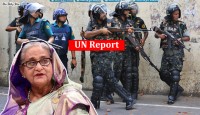The White House is complicit in the Massacre: World War III on the
Horizon?
Dr. Pamelia Riviere
At 2:30 am, before dawn prayer, while 15 months of war-torn, devasted Palestinian children,
women, and men were in a deep sleep, Israel began fighting again in Gaza. The key question is:
Who are they fighting against? Is this a war on defenceless civilians? Here’s what you need to be
aware of. Israel has initiated a new series of airstrikes using 100 airplanes in Gaza on the second
day of its renewed offensive in the war-torn Palestinian area. These attacks were considerably
less intense than the significant strikes earlier on Tuesday morning, which resulted in over 400
fatalities and disrupted the relative calm since a ceasefire began on January 19, halting 18
months of conflict, according to the Guardian's report.
The truce was broken, and mass killing continued: Today, Israeli forces have killed another
100 Palestinians, bringing the death toll to over 700 in just three days since the Gaza ceasefire
was terminated. The Israeli military has re-entered the Gaza Strip, regaining control of the
Netzarim Corridor, which splits the besieged Palestinian area into two parts. For the third
consecutive day, Israel continues to bombard Gaza from land, air, and sea after unilaterally
ending the ceasefire on Tuesday, as reported by Democracy Now. Al Jazeera reports that since
Israel broke the truce on Tuesday, 200 children have lost their lives, and 1,042 have been injured
in the enclave. Since dawn on March 20, 2025, at least 110 individuals have been killed.
The UN reports that over 140,000 people have been displaced in Gaza within a week amid
escalating Israeli assaults. The Gaza Health Ministry reported that Israeli assaults resulted in a
minimum of 39 deaths, including children, and caused injuries to 124 individuals throughout
Gaza in 24 hours on Wednesday. Assaults were indicated across the region, specifically in
Jabalia in northern Gaza, as well as in Khan Younis and Rafah in the southern part of the
enclave, as noted by Al Jazeera on March 26, 2025. Since October 7, 2023, a total of 20,270
children have lost their lives; among them, 270 children were killed following the ceasefire.
The breakdown of the ceasefire between Hamas and Israel follows weeks of delicate
negotiations. It could lead to more suffering for the people in Gaza after Israel halted electricity
and restricted humanitarian assistance. What transpired? Airstrikes targeted various regions in
Gaza, with hospitals in the north, center, and south reporting casualties. CNN reporters on the
ground detected strikes in several areas, including Gaza City, Khan Younis, and Deir al-Balah.
On March 26, 2025, at least 13 individuals were killed in three separate drone strikes in central
Gaza. These strikes targeted an aid kitchen and two camps for displaced Palestinians. On March
27, 2025, at least 38 Palestinians were killed. This morning, on March 28, 2025, Israeli attacks
resulted in nearly 50 deaths across Gaza within the past 24 hours. Reports indicate that Israel
kills a child in Gaza every 45 minutes, averaging approximately 30 children killed each day over
the past 535 days, according to Al Jazeera.
Additionally, an Oxfam report dated January 11, 2024, states that the Israeli military is
responsible for the deaths of at least 250 Palestinians each day, with even more lives at risk due
to hunger, disease, and cold.
Israel Stated About Fighting in Gaza: Is Israel fighting in Gaza with innocent unarmed
civilians or Hamas? The Israeli military and security agency announced they were “conducting
extensive strikes” aimed at Hamas positions in Gaza. “Last night, we resumed our fighting in
Gaza,” stated Israel’s Defense Minister, Israel Katz. Israeli Prime Minister Benjamin Netanyahu
pledged to increase military action against Hamas, asserting that Hamas had declined to extend
the ceasefire agreement. The strikes will persist “as long as necessary and will extend beyond
airstrikes,” an Israeli official informed CNN.
Furthermore, the Israeli representative to the UN declared there would be “no mercy” while
hostages remain held in Gaza. Israel accused Hamas of rejecting all proposals made by US
presidential envoy Steve Witkoff and other mediators. In response, Hamas claimed that
Netanyahu and his administration made a unilateral choice to end the ceasefire, putting the
captives in Gaza at risk of an uncertain fate.
A Hamas leader cautioned that the airstrikes posed a “death sentence” for the remaining Israeli
hostages in the territory. Regarding the US: The Trump administration was informed by Israel
before the strikes on Gaza, as stated by White House press secretary Karoline Leavitt on
Monday. “As President Trump has clearly indicated, Hamas, the Houthis, and any who seek to
terrorize both Israel and the United States will face the consequences,” Leavitt told Fox News,
asserting that Trump would back “our friend and ally Israel.”
The delicate ceasefire in Gaza collapsed early Tuesday as Israel conducted what it termed
“extensive strikes” against Hamas positions, with Israeli Prime Minister Benjamin Netanyahu
pledging to deploy “increasing military strength” against the militant organization and Defense
Minister Israel Katz stating: “Tonight we resumed fighting in Gaza.” Hamas accused Israel of
violating the nearly two-month-long ceasefire agreement and “putting the captives in Gaza at
risk of an unknown fate.” Israel countered that Hamas had “repeatedly” refused to free hostages
and turned down mediation proposals. The strikes by Israel have resulted in over 200 fatalities
and left hundreds injured, as reported by Gaza’s Health Ministry. The Gaza Civil Defense
indicated that individuals were “trapped under the rubble of homes that were bombed in various
areas.” CNN stringers in Gaza noted the sounds of strikes across multiple locations.
Israel Consulted with the Trump Administration Prior to the Gaza strikes: “Hamas, the
Houthis, and all who aim to terrorize not only Israel but also the United States of America will
pay a price. White House press secretary Karoline Leavitt told Fox News, "All hell will break
loose.
The recent airstrikes in Gaza occurred in the early morning hours without any prior warnings,
leading to significant civilian casualties among innocent Gazans.
This indiscriminate violence raises serious concerns about the humanitarian crisis unfolding in
the region, with many observers labelling it as a form of genocide. The complicity of the White
House in this situation has come under scrutiny, as reports are indicating that former President
Trump was consulted before Israel's latest military action.
This raises questions about the extent of U.S. involvement in the ongoing conflict and the
responsibilities that come with it. As Israel resumes its military operations in Gaza, the
international community watches closely, alarmed by the rising death toll and the deteriorating
conditions for civilians caught in the crossfire.
It is deeply troubling to witness the actions of leaders like Netanyahu and Trump, particularly in
their response to the ongoing violence against innocent civilians. During the holy month of
Ramadan, specifically at 2:30 a.m., when families, including women and children, were often
peacefully asleep, Israel launched a severe attack on civilian areas in Gaza. This escalation has
resulted in significant casualties and further suffering among an already vulnerable population.
The US Complicit in Genocide: Recent developments reveal that before initiating this latest
offensive, Israeli officials consulted with President Trump, as confirmed by White House Press
Secretary Karoline Leavitt. She stated, "As President Trump has made clear, those who harbour
and support terrorism, including Hamas, the Houthis, and Iran, will face the consequences. Their
actions not only threaten Israel but have ramifications for the United States as well—there will
be a reckoning."
Israel consulted the Trump administration before its military strikes in Gaza, a significant
development in international relations during a time of escalating conflict. White House press
secretary Karoline Leavitt confirmed that the Israeli government informed the Trump
administration prior to launching what was described as “extensive strikes” in the region. In an
interview with Fox News, Leavitt emphasized the close coordination between the administration
and Israeli officials, stating, “The Trump administration and the White House were consulted by
the Israelis on their attacks in Gaza tonight. As President Trump has made it clear, Hamas, the
Houthis, and all those who seek to terrorize not only Israel but also the United States will face
severe consequences. All hell will break loose.” Leavitt's remarks underscored the
administration's stance on Middle Eastern terrorism, warning that “all of the terrorists in the
Middle East, including Iranian-backed terror proxies and Iran itself, should take President Trump
seriously when he says he’s steadfast in his support for law-abiding citizens.”
The operations were ordered by Israeli Prime Minister Benjamin Netanyahu and Defense
Minister Israel Katz, who justified the military action by accusing Hamas of consistently refusing
to release hostages. They also noted Hamas’s rejection of multiple diplomatic overtures from
U.S. presidential envoy Steve Witkoff, as well as other mediators striving to resolve the hostage
situation. The strikes were portrayed as a necessary response to a perceived threat, underscoring
the intricate interplay between military action and diplomatic efforts in the region.
Leavitt reinforced the message by highlighting the seriousness with which Trump approaches
foreign policy.
She asserted that groups like the Houthis, Hezbollah, and other Iranian-backed entities should
recognize that Trump is prepared to defend both American interests and Israel's sovereignty. "He
is unwavering in his commitment to uphold the rights of law-abiding citizens and protect our
allies," she added in an interview with Fox News. This rhetoric emphasizes the ongoing
complexities of international relations and the impact of leadership decisions on global stability.
At least 308 Palestinians have been killed as Israel launched a massive assault on Gaza,
shattering the fragile two-month-old ceasefire with Hamas.
Those killed in Tuesday’s attack included at least 77 people in Khan Younis in southern Gaza
and at least 20 people in Gaza City in the north, medical sources told Al Jazeera. Israeli strikes
also hit locations in central Deir el-Balah and Rafah in the south.
Early on Tuesday morning, Israel conducted airstrikes in Gaza, resulting in the deaths of over
308 individuals, including a significant number of children.
Many women and children were among more than 223 Palestinians killed in Israeli air attacks
across the Gaza Strip, according to Gaza’s Health Ministry.
This action has been described as a “treacherous” assault on civilians who are already under
siege, with the intent of undermining a ceasefire agreement that had been in effect since January
19.
The strikes targeted densely populated urban areas, makeshift schools, residential buildings, and
locations where displaced people sought shelter in tents.
These attacks occur amid a worsening humanitarian crisis in Gaza, where Israel has imposed a
blockade preventing the entry of humanitarian aid and goods for more than two weeks. The
Israeli government, led by Prime Minister Netanyahu, stated that the military action was a
response to Hamas's ongoing refusal to release remaining captives and its failure to accept
ceasefire proposals put forward by U.S. presidential envoy Steve Witkoff and other mediators.
Israeli Prime Minister Benjamin Netanyahu announced that he had instructed the Israel Defense
Forces (IDF) to implement “strong action” against Hamas in the Gaza Strip, citing the group's
refusal to comply with demands to release hostages and its rejection of Israel’s proposals aimed
at establishing a ceasefire. In a statement from the Prime Minister’s Office, it was emphasized
that “Israel will, from now on, act against Hamas with increasing military strength,”
underscoring a shift to a more aggressive military strategy in the ongoing conflict.
Hamas, meanwhile, has accused Netanyahu of lacking genuine interest in achieving a resolution
to the hostilities, claiming that his actions suggest a prioritization of military objectives over
diplomatic solutions. The ongoing standoff has raised tensions in the region, with both sides
facing significant pressure from their respective constituencies.
Aggression and Eviction in the West Bank Continued: Israel has intensified its military
operations in the West Bank, leading to the displacement of over 40,000 residents since October
7, 2023. Amjad Abu El Ezz, a professor of political science at the Arab American University in
Ramallah, notes that while Israel has not officially declared war on the occupied West Bank, the
scale and intensity of the military escalation have reached unprecedented levels. He further
emphasizes that there appears to be a long-term strategic plan from Israeli officials, particularly
citing remarks from Bezalel Smotrich, Israel's far-right Finance Minister, who has openly
expressed intentions to expand illegal Israeli settlements throughout the West Bank.
Reports indicate that armoured tanks are advancing into key areas such as Jenin, leading to
significant damage to Palestinian infrastructure and livelihoods. Al Jazeera has highlighted the
dire situation, illustrating how these military campaigns are not only displacing people but also
systematically undermining the essential services and economic foundations of Palestinian
communities.
The United Nations agency responsible for Palestinian refugees has raised alarms about the rapid
escalation of forced displacements, particularly affecting communities in the northern part of the
West Bank. The situation is increasingly critical, drawing international concern regarding the
humanitarian implications and the broader impact on regional stability.
Unfortunately, Israel’s government has firmly committed to escalating its military attacks in
Gaza, citing Hamas’s refusal to extend the ceasefire that has been upheld since January. This
decision comes amid heightened tensions in the region, with growing concerns over civilian
safety and humanitarian conditions in Gaza. However, one must question whether this stated
rationale truly reflects the underlying motives behind this morning’s aggressive military action.
Could there be a more cynical explanation potentially linked to the political fortunes of Prime
Minister Benjamin Netanyahu? As his government grapples with domestic challenges and
dwindling public support, the timing of these operations raises critical questions about the
intersection of military strategies and political survival in Israel.
A Good Initiative to Reveal the Facts of the CIA, JFK Declassified file and 911
President Trump is actively working to unveil the CIA's extensive influence globally, as well as
to investigate the unresolved issues surrounding the assassination of President John F. Kennedy
and the tragic events of September 11, 2001. The questions regarding the true culprits behind
JFK's assassination continue to provoke debate and speculation. In a notable move, Trump has
released declassified files related to this case, which many view as a constructive step toward
transparency. Simultaneously, the details surrounding the September 11 attacks remain shrouded
in confusion and conspiracy theories, leaving many Americans seeking clarity about the event's
origins and the individuals responsible for it. However, Trump's initiative would help to identify
who tried to kill himself as well.
Additionally, a recent leak regarding an airstrike in Yemen has raised serious concerns,
suggesting that a senior U.S. official may be revealing sensitive information that could have
significant implications for national security.
I align with Trump’s initiatives on these critical matters, believing that a thorough examination
could lead to accountability and understanding. Furthermore, I hope he will take decisive action
to bring an end to the ongoing conflict in Gaza. Unlike President Biden, who has faced criticism
for his handling of the situation, Trump at least attempted to broker a ceasefire, indicating a
willingness to prioritize peace. It's essential to recognize that neither the Houthi movement nor
Iran should be viewed as America's primary adversaries.
Tragically, many past presidents, including Trump, seem to have overlooked the needs and
interests of the American people, becoming preoccupied with supporting Israel and groups like
the American Israel Public Affairs Committee (AIPAC). This focus has, at times, led to a
disconnect with the American electorate. The influence of AIPAC on U.S. Congress and
politicians complicates these issues, as elected officials often feel beholden to their interests.
Leaders must break away from this complex web of obligations and address the pressing issues
facing America. Now is the time to rekindle the vision of "Making America Great Again" by
realigning America’s foreign policy better to reflect the interests and well-being of the American
populace.
Information Leak: Dragging America to Third World War by Israel
The Trump Administration Accidentally Texted Me Its War Plans. The Headline was written by
Jeffrey Mark Goldberg, an American journalist who serves as editor-in-chief of The Atlantic. He
wrote that the U.S. national security leaders included me in a group chat about upcoming
military strikes in Yemen. I didn’t think it could be real. Then, the bombs started falling.
According to an Al Jazeera report, several air strikes have hit northern Yemen. Houthis reported
that they carried out attacks on United States warships in the Red Sea and launched drones at
military sites in Israel. Houthi-affiliated media further reported on Wednesday, 26 th March 2025,
that at least 17 strikes hit Saada and Amran, blaming the US for the attacks.
The leak of sensitive information is emerging as a significant issue within the Trump
administration, highlighting concerns about the efficacy of U.S. intelligence operations.
Goldberg has shed light on a troubling incident involving prominent national security officials
who faced intense scrutiny from outraged Democrats during a Senate Intelligence Committee
hearing on Tuesday. It was revealed that a group chat on the encrypted messaging app Signal
inadvertently disclosed plans for a military strike in Yemen to a journalist, raising alarms about
the handling of classified information.
During the hearing, Director of National Intelligence Tulsi Gabbard and CIA Director John
Ratcliffe both staunchly denied that the chat contained any classified material. However, they
seemed to deflect responsibility onto Defense Secretary Lloyd Austin, arguing that he was the
one responsible for designating information as classified. In contrast, reports indicate that texts
from Fox News contributor Pete Hegseth detailed the operational aspects of the anticipated
strikes on Yemen, revealing crucial information such as specific targets, the types of weaponry
that U.S. forces would employ, and the sequence of planned attacks. Current and former defense
officials have emphasized that such discussions are typically classified due to the inherent risks
they pose to U.S. military personnel and ongoing operations. The context of these actions aligns
with Trump's broader foreign policy strategy, which appears to prioritize appeasing Israel
through military aggression, including the resumption of conflict in Gaza and the initiation of an
attack in Yemen.
Additionally, Trump has issued threats to Iran, insisting that they must engage in discussions
regarding their nuclear weapons program by Spring. Political analysts, however, critique these
strategies, arguing that both the Houthis and Iran should not be viewed as adversaries to the
United States. Instead, they point to Israel as a significant factor undermining U.S. interests and
potentially leading the nation into a catastrophic third world war. They warn that if the U.S.
continues its unwavering support for Israel and becomes the scapegoat of the Israeli lobby while
intensifying hostilities toward Iran, it risks not only its economy but also destabilizing the
balance of global power dynamics.
World War III Soon? Prof. Jeffrey Sachs recently expressed deep concerns about the escalating
tensions between the United States and Iran, suggesting that former President Donald Trump
could potentially initiate military action against Iran. Sachs believes that global leadership is
increasingly falling into the hands of individuals who lack the competencies and vision necessary
to foster lasting peace and stability.
Meanwhile, Professor John Mearsheimer highlighted a troubling trend in contemporary
governance: a growing sense of impunity among political leaders. He pointed out that many
officials seem to operate without accountability, frequently resorting to deception and
manipulation. This pervasive dishonesty contributes to a significant erosion of trust and a
troubling absence of objective truth in political discourse.
In light of these geopolitical uncertainties, the European Union has issued a warning, advising its
450 million citizens to prepare for potential emergencies. The EU recommends that individuals
stockpile essential supplies, such as non-perishable food and water, to sustain themselves for at
least 72 hours in case of a crisis.
Given the current global climate, one must seriously ponder the implications: Is there a looming
possibility of World War III on the horizon? The convergence of political instability, military
provocations, and a crisis in ethical governance raises alarming questions about international
peace and security.
Note: Reports from Al Jazeera, CNN, the UN, OXFAM and other media outlets have extensively
covered these developments.
Dr. Pamelia Riviere is a freelance writer and an analyst.



.jpg)







